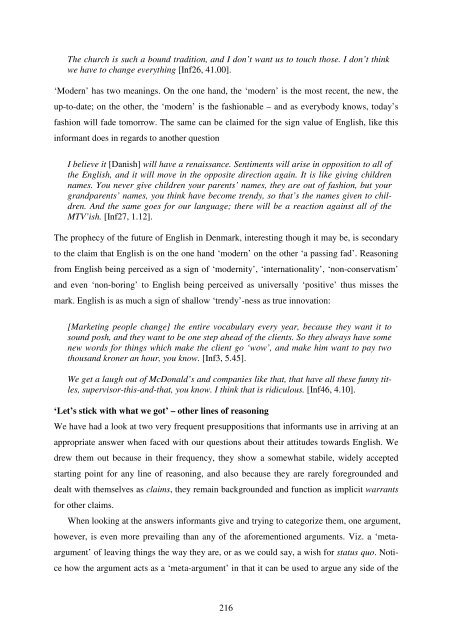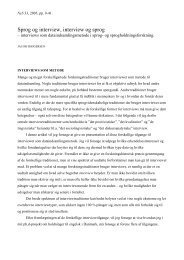Hør dog hvad de siger - Note-to-Self: Trials & Errors
Hør dog hvad de siger - Note-to-Self: Trials & Errors
Hør dog hvad de siger - Note-to-Self: Trials & Errors
Create successful ePaper yourself
Turn your PDF publications into a flip-book with our unique Google optimized e-Paper software.
The church is such a bound tradition, and I don’t want us <strong>to</strong> <strong>to</strong>uch those. I don’t think<br />
we have <strong>to</strong> change everything [Inf26, 41.00].<br />
‘Mo<strong>de</strong>rn’ has two meanings. On the one hand, the ‘mo<strong>de</strong>rn’ is the most recent, the new, the<br />
up-<strong>to</strong>-date; on the other, the ‘mo<strong>de</strong>rn’ is the fashionable – and as everybody knows, <strong>to</strong>day’s<br />
fashion will fa<strong>de</strong> <strong>to</strong>morrow. The same can be claimed for the sign value of English, like this<br />
informant does in regards <strong>to</strong> another question<br />
I believe it [Danish] will have a renaissance. Sentiments will arise in opposition <strong>to</strong> all of<br />
the English, and it will move in the opposite direction again. It is like giving children<br />
names. You never give children your parents’ names, they are out of fashion, but your<br />
grandparents’ names, you think have become trendy, so that’s the names given <strong>to</strong> children.<br />
And the same goes for our language; there will be a reaction against all of the<br />
MTV’ish. [Inf27, 1.12].<br />
The prophecy of the future of English in Denmark, interesting though it may be, is secondary<br />
<strong>to</strong> the claim that English is on the one hand ‘mo<strong>de</strong>rn’ on the other ‘a passing fad’. Reasoning<br />
from English being perceived as a sign of ‘mo<strong>de</strong>rnity’, ‘internationality’, ‘non-conservatism’<br />
and even ‘non-boring’ <strong>to</strong> English being perceived as universally ‘positive’ thus misses the<br />
mark. English is as much a sign of shallow ‘trendy’-ness as true innovation:<br />
[Marketing people change] the entire vocabulary every year, because they want it <strong>to</strong><br />
sound posh, and they want <strong>to</strong> be one step ahead of the clients. So they always have some<br />
new words for things which make the client go ‘wow’, and make him want <strong>to</strong> pay two<br />
thousand kroner an hour, you know. [Inf3, 5.45].<br />
We get a laugh out of McDonald’s and companies like that, that have all these funny titles,<br />
supervisor-this-and-that, you know. I think that is ridiculous. [Inf46, 4.10].<br />
‘Let’s stick with what we got’ – other lines of reasoning<br />
We have had a look at two very frequent presuppositions that informants use in arriving at an<br />
appropriate answer when faced with our questions about their attitu<strong>de</strong>s <strong>to</strong>wards English. We<br />
drew them out because in their frequency, they show a somewhat stabile, wi<strong>de</strong>ly accepted<br />
starting point for any line of reasoning, and also because they are rarely foregroun<strong>de</strong>d and<br />
<strong>de</strong>alt with themselves as claims, they remain backgroun<strong>de</strong>d and function as implicit warrants<br />
for other claims.<br />
When looking at the answers informants give and trying <strong>to</strong> categorize them, one argument,<br />
however, is even more prevailing than any of the aforementioned arguments. Viz. a ‘meta-<br />
argument’ of leaving things the way they are, or as we could say, a wish for status quo. Noti-<br />
ce how the argument acts as a ‘meta-argument’ in that it can be used <strong>to</strong> argue any si<strong>de</strong> of the<br />
216



